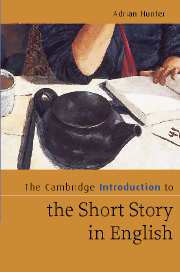Book contents
- Frontmatter
- Contents
- Acknowledgements
- Introduction
- Part I The nineteenth century
- Part II The modernist short story
- Part III Post-modernist stories
- Part IV Postcolonial and other stories
- Introduction: a ‘minor’ literature?
- Chapter 11 Frank Sargeson and Marjorie Barnard
- Chapter 12 James Kelman and Chinua Achebe
- Chapter 13 Alice Munro
- Notes
- Guide to further reading
- Index
- Titles in this series:
Introduction: a ‘minor’ literature?
Published online by Cambridge University Press: 05 June 2012
- Frontmatter
- Contents
- Acknowledgements
- Introduction
- Part I The nineteenth century
- Part II The modernist short story
- Part III Post-modernist stories
- Part IV Postcolonial and other stories
- Introduction: a ‘minor’ literature?
- Chapter 11 Frank Sargeson and Marjorie Barnard
- Chapter 12 James Kelman and Chinua Achebe
- Chapter 13 Alice Munro
- Notes
- Guide to further reading
- Index
- Titles in this series:
Summary
What connects the writers in this section is that they have all written in the aftermath of colonial disturbance. The question that immediately presents itself is why, of all the interventions we might choose to make in the corpus of twentieth-century short fiction, should we choose to make this one?
The direct answer to this is that the short story is, and always has been, disproportionately represented in the literatures of colonial and postcolonial cultures. The reasons for this are numerous and difficult to determine and they change from culture to culture. But as a starting point, we might want to say that, as in the late-Victorian period, economic considerations have played an important part. In cultures with small or non-existent publishing infrastructures, the low-capital, low-circulation literary magazine tends to be the main outlet for new writing. Such magazines, for reasons of space and means of production, invariably favour the short story over longer forms of fiction.
Beyond that, several critics have attempted to argue that the short story is particularly suited to the representation of liminal or problematized identities – Frank O'Connor's ‘submerged population groups’ once again – and that in the ruptured condition of colonial and postcolonial societies, the form speaks directly to and about those whose sense of self, region, state or nation is insecure. It is on such grounds that writers from places as far apart geographically as they are socially and historically – from Ireland to Australia to America, France and India – have wanted to claim the short story as their own.
- Type
- Chapter
- Information
- The Cambridge Introduction to the Short Story in English , pp. 138 - 141Publisher: Cambridge University PressPrint publication year: 2007



